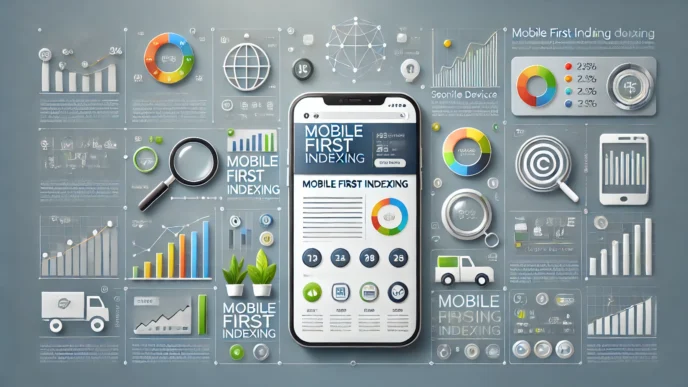Link building is a key part of any SEO strategy to help your site show up in Google’s search results. While factors like user experience, how fast your page loads, and how easily it can be crawled are becoming more important, links still hold significant weight. They help build your website’s authority and increase its value in Google’s eyes, which can boost your chances of landing on the first page of search results.
Link Building: What is it? and Why It Still Matters in SEO
Link building isn’t just about placing links on external sites. It’s a strategic process focused on boosting your website’s authority, value, and search engine rankings by creating meaningful connections between different sites.
There are two main types of link-building approaches:
- Link Earning: This happens naturally when other website owners find your content valuable and relevant to their own, so they link to it voluntarily.
- Link Building: A more proactive marketing approach designed to gain backlinks quickly. It involves targeting high-authority websites for mentions, which Google uses as a signal to evaluate the value of your site.
Finding Backlinks: Quality vs. Quantity
When building backlinks, it’s important not to rush into gathering as many links as possible, especially for new websites. Accumulating too many links quickly can seem unnatural to Google and might lead to penalties, hurting your site’s ranking instead of improving it.
It’s better to focus on building links slowly and naturally. Start by creating high-quality content that boosts your site’s authority. Once you’ve established that, you can shift your attention to more active link-building strategies.
Evaluating the Quality of Backlinks
The quality of a backlink depends on several key factors: the website’s popularity, its authority, how relevant the topic is to your site, and even its location. When choosing where to get backlinks from, targeting sites specific to your industry is better. While general sites with high authority can still help, focusing on niche websites ensures your content reaches the right audience and builds stronger relevance in your field.
Why is Link Building Important?
With the rise of AI, creating large amounts of high-quality content has become easier. However, this has made much of the content on the web quite similar. As a result, search engines are now looking beyond just content quality when assessing a site’s credibility. One of the main factors they rely on is the quality and quantity of backlinks pointing to a website. This links building an essential strategy for improving your site’s authority and ranking in search results.
10 Strategies for Link Building
Building a solid link strategy requires thoughtful planning and a deep understanding of your website and competitors. Once you’ve done a thorough analysis, here are 10 strategies you can use to start building links:
Analyze Your Competitors’ Backlinks
One effective way to enhance your link-building strategy is by analyzing your competitors’ backlinks. This process helps you identify the types of content that attract the most links within your industry. By observing what works for sites that rank higher in the search engine results pages (SERPs), you can discover key topics to focus on.
Consider offering a unique perspective or fresh insights on popular subjects. This approach not only helps you stand out but also positions your content as valuable and relevant, increasing the likelihood of earning backlinks.
Publishing Articles on External Blogs and Co-Marketing
One effective way to secure quality backlinks is by collaborating with external blogs. These partnerships create valuable links that benefit both parties involved.
1. Posting Articles on External Blogs:
When you publish articles on external blogs, you provide the host site with high-quality content that enhances their user experience. This not only enriches their audience’s knowledge but also allows your site to gain authoritative links. Additionally, it helps you reach a broader audience that you might not have connected with otherwise.
2. Co-Marketing:
Co-marketing takes this collaboration a step further. In this approach, both partners work together to produce content that is relevant to their shared audience. Unlike simply posting on external blogs, co-marketing involves a strategic partnership where both parties complement each other’s offerings. This targeted method attracts a specific audience interested in both partners’ products or services.
By leveraging these strategies, you can enhance your link-building efforts while providing value to your partners and their audiences.
Contacting Sites That Mention Your Brand
If you want to enhance your link-building strategy, start by identifying sites that mention your domain or brand but haven’t linked to you. These unlinked mentions present a fantastic opportunity to create new backlinks.
1. Find Unlinked Mentions:
Use tools like Google Alerts or Mention to track where your brand is being discussed online. Search for variations of your brand name or domain to uncover these valuable mentions.
2. Reach Out to Site Administrators:
Once you’ve identified sites that mention your brand, contact the site administrators or content creators. Politely request that they add a link to your website in their content.
3. Highlight the Benefit:
When reaching out, explain how linking to your site would benefit their audience. This can include providing additional resources, supporting claims made in their content, or enhancing the overall user experience.
By proactively seeking out these opportunities, you can build meaningful backlinks and strengthen your online presence.
Blocking Low-Quality Backlinks
Maintaining a healthy backlink profile is crucial for your website’s SEO success. One effective strategy is to block low-quality backlinks that could harm your site’s authority. Here’s how to do it:
1. Utilize Google Search Console:
Start by using Google Search Console to monitor your backlinks. This tool provides valuable insights into the domains linking to your site. Regularly check for any low-quality or spammy backlinks.
2. Identify Unwanted Domains:
Once you’ve identified low-quality domains, take note of them. These are links that could negatively impact your website’s reputation and search engine ranking.
3. Communicate with Google:
In Google Search Console, you can use the Disavow Links tool to inform Google about the domains you want to ignore. By submitting a list of unwanted links, you’re telling Google not to consider them when evaluating your site.
4. Improve Quality Recognition:
The more you use this function, the better Google will understand your preferences. Over time, this helps the search engine automatically recognize and prioritize quality links.
By actively managing your backlink profile, you can protect your website’s authority and ensure that it continues to perform well in search results.
Press Relations
Building strong relationships with the press is a key strategy for enhancing your site’s visibility on major news portals. Here’s how you can effectively leverage press relations:
1. Engage with News Portals:
To get your site mentioned on influential news portals, it’s essential to establish contacts with journalists and editors. These platforms, while generalist in nature, provide access to a vast audience and can significantly boost your online presence.
2. Activate a Press Office:
Consider setting up a press office dedicated to managing relationships with the media, including editorial staff and influencers. A press office plays a crucial role in ensuring your site gets the attention it deserves.
3. Communicate Your Story:
The primary task of the press office is to communicate and promote your site’s activities and newsworthy content to various media outlets. This involves crafting compelling press releases and outreach strategies that highlight your key messages.
4. Build Credibility and Trust:
By maintaining consistent communication and providing valuable information to journalists, you can build trust and credibility. Over time, this relationship can lead to more mentions and backlinks from reputable sources.
By focusing on effective press relations, you can enhance your brand’s visibility and drive valuable traffic to your website.
Local Marketing: Building Community Connections for Quality Backlinks
If you have a well-positioned business in your area, local marketing can be a fantastic way to generate interest and create meaningful collaborations. Here are some actionable strategies to help you maximize your local presence:
1. Organize Local Initiatives:
Consider hosting events that involve local wellness-oriented businesses. This not only strengthens your community ties but also creates opportunities for collaboration. For example, you could organize workshops, health fairs, or charity events that promote well-being while showcasing your business.
2. Gain Media Attention:
Engaging with your local community can attract the attention of local media outlets. By sharing your initiatives and successes, you increase the chances of being mentioned in local news articles or blogs. This exposure can lead to valuable backlinks from reputable sources.
3. Enhance Local SEO:
Participating in local marketing efforts can significantly boost your local SEO. Links generated from local collaborations and events contribute to better rankings in local search results, making it easier for potential customers to find your business online.
4. Build Strong Relationships:
Local initiatives allow you to connect with customers and other businesses on a personal level. These relationships foster trust and loyalty, leading to referrals and recommendations that can drive traffic to your website.
Keep Your Content Fresh
To keep your website relevant and engaging, it’s important to regularly update your most popular content. Here are some simple steps to follow:
Stay Current: Continuously monitor developments and trends related to your topics. This helps you identify what’s new and relevant for your audience.
Promote Your Updates: Share your refreshed content across your social media channels and newsletters to reach a wider audience.
Engage Your Readers: Encourage feedback and interaction with your content to keep the conversation going. This not only boosts engagement but also helps you understand what your audience wants.
By ensuring that your content remains up-to-date, you’ll maintain your status as a trusted source and keep your visitors coming back for more!
Optimize Your Internal Links
Effective internal linking is key to improving your website’s SEO and user experience. Here’s how to use link attributes correctly:
Dofollow Links: These links pass authority from one page to another, positively impacting the destination page’s ranking. Think of them as a vote of confidence from the source page, signaling to search engines that the linked content is valuable.
Nofollow Links: Unlike dofollow links, nofollow links do not transfer authority. They tell search engines not to consider these links when ranking the destination page. Use them wisely, primarily for links where you don’t want to endorse the content.
Fix Broken Links
Regularly checking your website for broken links and 404 errors is essential for maintaining a positive user experience and strong SEO performance. Here’s how to effectively manage broken links:
By fixing broken links and creating informative 404 pages, you enhance your site’s usability and retain visitors. Regular maintenance ensures that users can easily find the information they need, improving their overall experience on your site.
Broken Link Building
Broken link building is an effective strategy that involves identifying broken links on other websites and suggesting that the site administrators replace them with links to your relevant content. This method helps recover traffic and enhances your website’s authority by acquiring valuable backlinks. Here’s how to implement this technique:
Conclusion
Link building is a vital aspect of any successful SEO strategy. It plays a key role in enhancing your website’s visibility on Google’s search results pages (SERPs). While other factors like user experience, page loading speed, and crawlability are increasingly important, backlinks remain crucial for establishing authority and generating value in Google’s eyes.
To develop an effective link-building strategy, it’s essential to engage in careful planning, regular monitoring, and ongoing adaptation. By leveraging strong link-building practices, you can not only boost your site’s ranking but also strengthen its reputation and authority over time.




